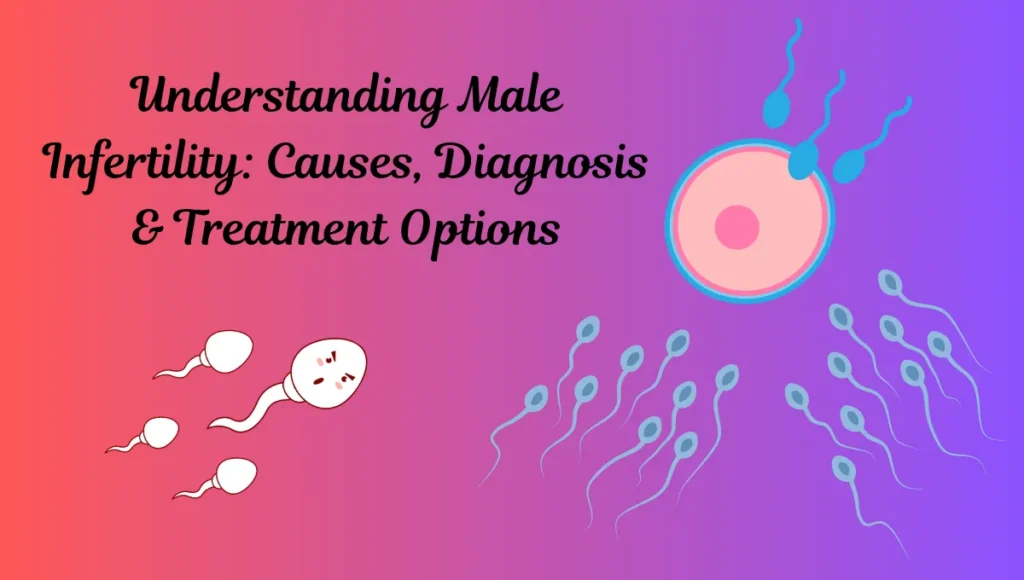What Are Main Causes of Male Infertility: Medical, Lifestyle & Environmental Factors Explained
1.Introduction
Infertility affects millions of couples worldwide, and in many cases, male factors play a significant role. Unfortunately, the conversation often focuses more on female infertility, leaving male reproductive health overlooked.
Understanding the main causes of male infertility is crucial for anyone trying to conceive. Identifying risk factors early can help prevent irreversible damage and increase the chances of a successful pregnancy.
In this guide, we’ll explore:
- The most common medical, lifestyle, and environmental causes.
- How male infertility is diagnosed.
- Available treatments and prevention tips.
- Emotional support options for men and couples facing fertility challenges.
2.What Is Male Infertility?
Male infertility is defined as the inability of a man to cause pregnancy in a fertile partner after 12 months of regular, unprotected intercourse. The issue can result from low sperm count, poor sperm motility (movement), abnormal sperm shape, or complete absence of sperm.
While some men produce sperm that appear normal, underlying issues like DNA fragmentation can still affect fertility. This is why understanding the main causes of male infertility is so important—many of these causes are treatable.
3.Prevalence & Global Impact
According to the World Health Organization (WHO), about 15% of couples worldwide experience infertility, and male factors are responsible for 40–50% of these cases. That means roughly 1 in 12 men may have fertility issues.
In some countries, cultural stigma and lack of awareness prevent men from getting tested, leading to delayed diagnosis. By shedding light on the main causes of male infertility, we can encourage earlier evaluation and better outcomes.
4. Main Causes of Male Infertility
The main causes of male infertility can be grouped into three categories: medical, lifestyle, and environmental.
Medical Causes
- Hormonal Imbalances
- Hormones like testosterone, follicle-stimulating hormone (FSH), and luteinizing hormone (LH) regulate sperm production.
- Disorders of the hypothalamus, pituitary gland, or thyroid can lower sperm count and quality.
- Example: A man with low testosterone due to pituitary dysfunction may experience reduced libido, erectile issues, and poor sperm health.
- Genetic Disorders
- Certain genetic abnormalities, such as Klinefelter syndrome (XXY chromosomes) or Y-chromosome microdeletions, impair sperm production.
- These conditions may also cause small testes, breast tissue growth, and hormonal imbalances.
- Varicocele
- Enlarged veins in the scrotum raise testicular temperature, damaging sperm production.
- This is one of the main causes of male infertility, affecting up to 15% of all men and 40% of infertile men.
- Infections
- STIs like chlamydia and gonorrhea, as well as mumps orchitis, can scar the reproductive tract.
- Chronic prostatitis (inflammation of the prostate) can also block sperm pathways.
- Chronic Illnesses
- Diabetes, kidney disease, and cancer treatments (chemotherapy/radiation) can reduce sperm quality and sexual performance.
- Certain medications, such as lisinopril, may also affect sexual function by influencing blood flow and hormone balance.
Lifestyle Causes
- Unhealthy Diet
- Diets low in antioxidants, zinc, and vitamins C and E increase oxidative stress, damaging sperm DNA.
- Processed foods, excessive sugar, and trans fats also harm sperm production.
- Substance Abuse
- Smoking lowers sperm count by 13–17% on average.
- Excessive alcohol reduces testosterone levels.
- Recreational drugs (marijuana, cocaine, anabolic steroids) severely impair sperm health.
- Excessive Heat Exposure
- Regular use of hot tubs, saunas, or tight underwear raises scrotal temperature, affecting sperm viability.
- Stress and Poor Sleep
- High stress increases cortisol, which suppresses reproductive hormones.
- Sleep deprivation disrupts testosterone production.
Environmental Causes
- Toxin Exposure
- Pesticides, heavy metals (lead, mercury), and industrial chemicals can damage sperm DNA.
- Men working in agriculture, manufacturing, or chemical plants are at higher risk.
- Radiation
- X-rays, CT scans, or occupational radiation exposure can reduce sperm count.
- Air Pollution
- Studies link urban air pollution and microplastics to declining sperm quality worldwide.
5.Diagnosis of Male Infertility
A thorough diagnosis is essential to identify the main causes of male infertility and create a tailored treatment plan.
Diagnostic Steps:
Medical History & Physical Exam – Check for past illnesses, sexual health issues, and physical abnormalities.
Semen Analysis – Measures sperm count, motility, and shape.
- You can also check your reproductive health with our Male Fertility Score Calculator for insights into sperm health and fertility potential.
Hormone Testing – Evaluates testosterone, FSH, and LH levels.
- Check your hormone balance with our FSH and LH Level checker to understand its role in fertility and reproductive health.
Genetic Testing – Detects hereditary conditions.
Ultrasound – Identifies varicocele or blockages.
6. Treatment Options
Treatments for the main causes of male infertility depend on the underlying problem.
- Hormone Therapy – Balances testosterone and other reproductive hormones.
- Surgery – Repairs varicocele or removes obstructions.
- Medications – Treats infections and inflammation.
- Assisted Reproductive Technology (ART) – Includes intrauterine insemination (IUI), in vitro fertilization (IVF), and intracytoplasmic sperm injection (ICSI).
- Lifestyle Modifications – Improves diet, reduces toxins, and promotes healthy habits.
7.Emotional & Psychological Impact
The main causes of male infertility don’t only affect the body—they can also impact mental health.
- Men may feel shame, guilt, or diminished self-worth.
- Couples may experience relationship stress.
- Counseling, support groups, and open communication help reduce the emotional burden.
8.Prevention Tips
While not all main causes of male infertility are preventable, some risk factors can be reduced:
- Maintain a balanced diet rich in antioxidants.
- Exercise moderately and maintain a healthy weight.
- Avoid smoking, excessive alcohol, and recreational drugs.
- Limit heat exposure to the testes.
- Use protective gear in workplaces with chemical exposure.
- Manage stress and get quality sleep.
Conclusion
Male infertility is a complex issue with a range of possible causes, including medical conditions, lifestyle factors, and environmental exposures. Understanding these factors and getting early treatment can significantly improve the chances of conception.
The Importance of Seeking Help
If you or your partner is struggling with infertility, it’s important to seek medical advice early. Treatments are available that can help overcome many causes of infertility.
Encouragement for Open Conversations
While infertility can be a difficult topic to discuss, having open conversations about it is crucial. Seeking support from healthcare providers, support groups, or mental health professionals can make a big difference don’t hesitate to ask for help.
FAQs
What are the common signs of male infertility?
The most common signs include low sperm count, erectile dysfunction, or difficulty ejaculating. However, many men may not exhibit obvious symptoms, and infertility is often discovered during fertility testing.
Can male infertility be completely treated?
Some causes of male infertility, like hormonal imbalances or infections, can be treated successfully, while others, such as genetic factors, may require assisted reproductive technologies.
How do lifestyle changes impact male fertility?
Making healthier lifestyle choices, such as eating a balanced diet, exercising regularly, and avoiding substances like tobacco and alcohol, can significantly improve sperm count and motility.
Is male infertility the same as erectile dysfunction?
No, erectile dysfunction involves difficulty achieving or maintaining an erection, while male infertility refers to problems with sperm production or quality that prevent conception.
What should partners of infertile men know?
Partners should offer emotional support, encourage open communication, and seek professional help when needed to navigate the emotional and physical challenges of infertility.
References
- World Health Organization (WHO). Infertility: Assessment, Diagnosis, and Treatment. Global statistics and prevalence of male infertility.
https://www.who.int/news-room/fact-sheets/detail/infertility - American Urological Association (AUA). Male Infertility: Clinical Guidelines for Diagnosis and Management.
https://www.auanet.org/guidelines/male-infertility-guideline - Mayo Clinic. Male Infertility: Causes, Risk Factors, and Treatments.
https://www.mayoclinic.org/diseases-conditions/male-infertility - National Institutes of Health (NIH) – National Institute of Child Health and Human Development. Male Reproductive Health and Fertility.
https://www.nichd.nih.gov/health/topics/male-reproductive-health - Cleveland Clinic – Urology & Men’s Health. Male Infertility: Lifestyle and Environmental Factors Affecting Sperm Quality.
https://my.clevelandclinic.org/health/diseases/15220-male-infertility - Harvard Medical School – Harvard Health Publishing. Environmental and Occupational Risks for Male Fertility.
https://www.health.harvard.edu/mens-health - Journal of Urology. Varicocele and Male Infertility: Diagnosis and Surgical Management. J Urol. 2018;200(4):1000–1007.
https://www.auajournals.org/doi/10.1097/JU.0000000000000345 - International Society for Fertility (ISF). Genetic and Hormonal Causes of Male Infertility.
https://www.internationalsocietyforfertility.org/male-infertility - American Society for Reproductive Medicine (ASRM). Lifestyle Factors and Male Fertility: Smoking, Alcohol, Diet, and Exercise.
https://www.asrm.org/topics/topics-index/male-infertility - Journal of Assisted Reproduction and Genetics. Oxidative Stress, Environmental Toxins, and Their Role in Male Infertility.
https://link.springer.com/journal/10815


